- Home
- Donald Hamilton
Matt Helm--The Interlopers Page 2
Matt Helm--The Interlopers Read online
Page 2
“Where do you get the grasshoppers?” I asked. I was trying hard to show the proper interest, but I wasn’t really interested in grasshoppers or even in big steelhead trout. I hadn’t been sent here for any fish, no matter how spectacular, and the interview wasn’t going right. There were certain things she was supposed to say in a certain way, if she was the right person, and she hadn’t said them. She’d been close, but in our business close isn’t good enough. The actual, specified words are supposed to be spoken.
“The grasshoppers?” she said. “Oh, you can chase them in the daytime, but I generally just pick them off the leaves after dark. What’s his name?”
Her mind wasn’t on angling either, I saw. She obviously was more interested in the pup.
“Hank,” I said.
“No, I mean his real name.”
“Oh. Well, officially he’s Avon’s Prince Hannibal of Holgate.” I grinned. “If you want the works, his sire was Field Champion Avon’s Prince Rufus, and his dam was Holgate’s Black Donna… What’s the matter?”
There was a funny look on her tomboy face. “He doesn’t look like one of the Avon dogs. I’ve seen pictures of them in the magazines, and they’re all built like greyhounds.” She laughed quickly. “Not that I’m running down your dog; I like the small, stocky type of Lab myself. After all, if you’re going to have a retriever, it ought to look like a retriever and not a racehorse, don’t you think?” She hesitated but went on before I could speak. “Of course you have papers on him.”
“Sure,” I said. She had me baffled; I couldn’t guess what she was driving at. I tried another grin. “But I’m afraid he’s not for sale.”
“Oh, I wasn’t thinking of buying him. But I have a little bitch who’s just come into heat and the dog to which I was planning to breed her… well, it didn’t work out, and I was wondering… could I see his papers?”
We’d considered all kinds of possibilities, setting this up, but the pup’s love life hadn’t really entered into our calculations.
I said, “Well, he’s pretty young to be used at stud, and I’m only in town for a day or two.”
She gave me a nice, unselfconscious grin. “How long does it take, actually? And I shouldn’t think it would hurt him to learn the facts of life.” She looked down at the black pup. He’d got wet again, visiting with her upriver, and now he was on his back, rolling himself happily in the dirt. In that position it was rather obvious that he was a little boy dog and not a little girl dog. The blond girl laughed. “He seems to have all the necessary equipment. He might as well learn how to use it.”
She was kind of a refreshing young lady, but if she wasn’t the person I’d come here to meet, I was wasting my time on her; in fact, she was an obstruction I’d better dispose of fast, before her presence scared off the real contact.
I said curtly, “I don’t really think—”
“Please,” she said softly. “I really want to get a good litter out of Maudie before she’s too old. She’s been… she’s been pretty great.” She stopped and cleared her throat. “Where are you staying in town? Or are you camping out?”
“No, I got tired of pioneering. I’m staying at the Thunderbird Motel, but…”
She said, “Please. I’ll pay any fee within reason. Your dog is really lovely. He’s just what I’ve been looking for. They’ll be beautiful pups. How about twelve o’clock? I’ll buy you a lunch and we can talk it over, and I’ll take you out to see Maudie. Of course I have to keep her penned up right now. She’s a very good Lab. You’ll like her…”
Ten minutes later, I was driving away, pretty well committed to officiating at a canine love-in. The time was up and the right words hadn’t been said to make the contact official. Either she wasn’t the one, or she was stalling for some reason, perhaps suspicion. Well, if she really knew dogs—and she seemed to—she had good reason to be suspicious.
3
I’d told Mac from the start that Mr. Smith from Washington was a damn fool, having me go to all the trouble of making my hair an exact match for the dead man’s but giving me a pup that, aside from being black and a Labrador, hardly resembled the dead dog at all.
Mac had called me into the San Francisco office he was using temporarily, to ask for a progress report. This was at the end of the third and final day of indoctrination and general remodeling, designed to make me think, look, and act like Grant Nystrom. More study would have been useful—on other occasions I’ve taken weeks, even months, to work up a character properly—but Nystrom’s schedule didn’t allow it. I had to be on the banks of the Columbia on time.
As always, Mac had managed to pick an office with a bright window behind his chair, but after working with him for quite a few years, I didn’t need to see him clearly. I knew what he looked like, crisp gray hair, black eyebrows, and all. I knew his business expressions by heart. He doesn’t have too many that he uses in the line of duty. You could call him poker-faced and get no argument from me. What he’s like at home, if he’s got a home, I wouldn’t know.
“Well, Eric?” he said.
“Just a minute, sir,” I said, and turned to the pup, who was showing signs of wanting to investigate the office, perhaps with ulterior motives. “Hank, sit! Now stay there. Stay!”
I sat down and looked across the desk apologetically. “I’m supposed to take him everywhere I go. He even sleeps in my hotel room. It plays hell with my love life—or would, if they gave me time for a love life.”
“I gathered they were keeping you pretty busy.”
“Yes, sir,” I said. “They’re trying hard, all those bright young characters working for Mr. Smith. But it isn’t going to work, sir.”
There was a little pause. When he spoke, the tone of the voice told me that the black eyebrows had lifted a fraction of an inch. “Why not? They seem to have done a good job on your hair. It’s a close match for that of the man we were taken to see in their private morgue. And I gather they have been able to give you a thorough knowledge of the late Mr. Nystrom’s likes and dislikes, his personal habits, and his current identification routines and itinerary.”
“Yes, sir,” I said. “They know more about Grant Nystrom’s private life than seems quite reasonable; more than they could possibly have got from simple surveillance, and they won’t tell me how they got it. Another thing they won’t tell me is why the guy was killed, although it’s a subject in which I have, I feel, a legitimate interest.”
“Maybe they don’t know.”
“Maybe,” I said. “But maybe they do know and just aren’t saying. They’re very selective about telling me things. The story I got was that the agent tailing the guy heard a couple of rifle shots. He’d been waiting in his car out of sight while Nystrom worked at training the pup out in the country somewhere. Hearing the shots, the agent decided he’d better drive up and take a look. He found them lying out in the field dead, man and dog both. As he got out and hurried over to them, a guy took off through the brush, jumped into a car, and drove away.”
Mac grimaced; he dislikes inefficiency. “Maybe Mr. Smith should teach his people a little more common sense and a little less security.”
“Yes, sir,” I said. “It was a pretty sloppy performance, all right. Maybe the agent in question couldn’t keep his subject from getting shot—maybe he wasn’t even supposed to—but he could at least have refrained from barging in clumsily until he’d got a good look at the murderer and learned what the guy was up to. Incidentally, the rifle was a .243, a pretty small caliber for a pro. It may be significant. I don’t know.”
“It seems to have been a professional enough job of shooting, Eric. Two shots; two dead bodies.”
“Yes, sir. But most pros would prefer to stack the deck in their favor by using somewhat bigger bullets. That six-millimeter rifle is pretty light. You’ve got more leeway with, say, a seven-millimeter or thirty-caliber gun. You’ve got some extra power in reserve, in case you don’t put the shot in exactly the right place.” I shrugged. “Anyway, after
letting the murderer get away unseen, the agent started behaving with reasonable intelligence for a change. He quickly bundled both stiffs, human and canine, into Nystrom’s pickup camper and drove it out of sight. Then he came back for his own car, taking time to clean up the premises. So the only people besides us who know Nystrom is dead, we hope, are the people involved in having him killed. At least we’re gambling that the outfit we’re trying to get the goods on—the Communist spy ring for which he was playing courier—hasn’t got the word.”
“Of course there’s always the possibility they did the killing,” Mac pointed out. “Couriers have been eliminated by their own people before now, when they turned unreliable or somebody thought they had. What evidence is there that this did not happen here?”
I said, “I asked the same thing of Mr. Smith’s young man.”
“And the answer?”
“Well, there’s the little amateur gun that was used.” I grimaced. “And then there’s some classified information, the source of which does not concern me, to the effect that our Communist friends are totally unaware that their courier is dead. I just love classified information the source of which does not concern me,” I said sourly. “Particularly when my life depends on it.”
Mac was frowning thoughtfully. “Then it would seem that you have two distinct adversaries, or groups of adversaries: the professional espionage ring and the amateurs—to judge by the rifle used—who killed Nystrom.”
“If this inside dope from mysterious sources is correct,” I said. “Well, it had better be. Otherwise I’m going to have a lot of fun trying to convince these Communist snoopers that I’m the ghost of their courier, the one they liquidated themselves.”
“You are also, of course, taking a considerable risk of meeting someone who knew the real Nystrom. Has this been taken into consideration?”
“Yes, sir. I’ve been assured that I’ve got a good chance of pulling it off because Nystrom never ran this northwest route before. Well, that’s what Mr. Smith thinks. Personally, I don’t think I have much chance of getting away with this impersonation even with people who never saw the real guy.”
“Just what is the problem, Eric?”
I said, “Well, aside from the normal risks and all the security crap I’ve got to put up with—hell, they won’t even tell me the nature of the earthshaking information this spy ring’s after—there’s the dog they insist on my using. Look at him!”
The pup thumped his tail on the carpet as we both looked at him. Mac asked, “What’s the matter with him?”
“Remember that poor beast we were shown with a bullet in his head? If you recall, that was a long-legged ridge-runner, sir, a tall, lean, rangy dog for a Lab. So what am I supposed to impersonate him with? Look at this low-slung little canine bulldozer—yes, I mean you!—built like a barrel, with only about half the road clearance of the dead dog. Oh, he’s a good pup, bright and well-trained, but—”
“Maybe that’s the point,” Mac said. “The training is very important, perhaps more important than the appearance. Nystrom’s retriever was known to have been professionally trained. If you appear with a dog that simply won’t mind you, that will give you away instantly.” He paused for a moment, and went on: “Besides, it is really Mr. Smith’s problem, is it not?”
I looked at him sharply. “I thought it was mine, too, sir.”
“Of course.” His voice was bland. “But essentially you are dependent upon the briefing and equipment supplied by Mr. Smith. If they should be faulty in any way, you can hardly be blamed for it. Or for the resulting failure—if failure should result. Of course we sincerely hope it won’t.”
I studied him for a moment, but his lean, expressionless features didn’t give me much help. However, it had already occurred to me to wonder just why he’d hung around here on the Coast for three days as if I required a chaperone, instead of just turning me over to our associates and heading back to Washington.
Well, I had my answer: we were going to be clever. It wasn’t going to be a straightforward impersonation job after all; it wasn’t just a friendly favor our outfit was doing for the brother-organization run by a nice man named Smith. We had, apparently, some problems of our own that could be solved by my making like a dead man named Nystrom, although of course we wouldn’t admit it for the world. I grimaced wryly, but I must admit I felt relieved in a way. I hadn’t really been comfortable in the role of the good guy in the white hat, riding to the rescue of my fellow government employees.
“Yes, sir,” I said. “Sincerely.”
“You have, of course, protested officially to Mr. Smith’s representatives. You have informed them that, in your opinion, the dog they have supplied will not do.”
“Yes, sir.”
“Then, if they stubbornly insist on your working with this animal, you are not responsible if your mission is unsuccessful due to such an obvious defect in your cover.”
“No, sir.”
There was another little pause. He was waiting for me to ask the question, and I was waiting for him to tell me the answer without being asked. Rather to my surprise, I won.
“Do you remember Kingston?” he asked. “You worked with him on a couple of occasions, did you not? Well, he was killed—knifed to death—last week in Anchorage, Alaska. And that is one count too many against the man who killed him, Eric. I think it is time you took care of Hans Holz. Permanently.”
I looked at his expressionless face for a moment longer. “Holz, eh?”
“Holz.”
“Okay,” I said. I rose. “If you say so, sir. Come on, pooch. We’ve got to go kill a guy named Holz.”
“Eric, sit down.”
“Just a minute, mutt,” I said. “Sit and listen. The gentleman has more to say to us.”
“You don’t approve, Eric?”
“No, sir,” I said. “I don’t like these damn vendettas. So Kingston went and got himself killed by Holz, and we’re sorry about that, but so what? I’ve done jobs with quite a few guys who died later, without charging out heroically to settle accounts with the guys who killed them. If Holz is threatening the welfare of the universe, the world, the United States of America, or even the state of Alaska, fine, I’ll be glad to look him up and dispose of him, if I can. But if all he’s done is kill somebody, hell, I’ve done that myself. Besides, haven’t you heard, sir? The man is dangerous. He’s one of their big guns, perhaps the biggest they’ve got right now. He’s been coming up steadily since we first heard of him back in the late fifties. I mean, going after him is apt to be, you know, kind of risky.”
Mac eyed me coldly. “Are you afraid of Holz, Eric?”
Now he was being ridiculous. I said, “Sure, I’m afraid of Holz. I’m afraid of any experienced pro who knows how and when to kill. He’s been around quite a while now, too long for it to be just dumb luck. He’s survived a lot of guys who’ve gone against him. That means he could survive even me, outlandish as such a thought might seem.”
“You’ve survived pretty well, too,” Mac pointed out.
“Yes, sir. And I’ve done it by never seeing myself in the part of an avenging angel or of some movie dope trying to prove he’s the fastest gun west of somewhere. Of course, I work for this outfit, and if you order me to go after the guy with the horns and the tail, I’ll step right out and have myself fitted for an asbestos suit. If you order me to hunt down Hans Holz, that’s that, and I’ll be on my way to Alaska or wherever. But I’d kind of like a better reason than an agent named Kingston who was old enough to take care of himself.”
“Well, I wasn’t exactly thinking of having you hunt down Mr. Holz,” Mac said deliberately. “I was rather thinking of having him hunt you down, if you know what I mean.”
I sighed. For once I was, if not ahead of him, at least not too far behind. “Yes, sir. It’s becoming clear to me, gradually. So that’s why you encouraged this masquerade.”
“Precisely. I am glad to hear that the dog is not all he should be. And I am happy to s
ee that you do not really resemble the dead man very much, except in the basic dimensions. Do you understand, Eric?”
I said, “Let us say that outlines are appearing through the fog. But perhaps you would care to blow the mists aside a little farther, sir.”
Mac nodded. “As far as our associates are concerned, you are impersonating the dead man to the best of your ability, as of course you are. You will endeavor to carry out the mission they have assigned you. You will do your best to keep your cover intact, such as it is. However, you know and I know that your best will probably not be good enough. This type of impersonation is inherently improbable anyway; it’s a television gambit that’s very unlikely to succeed in real life.”
“Yes, sir,” I said. “So you expect my cover to be blown, sooner or later. And then what?”
“That,” he said, “is a very foolish question, Eric.”
“Excuse me. Of course. When my cover is blown, they’ll kill me. Or try.”
“Precisely. And whom will they call upon to perform this distasteful task? The average spy is a specialist at gathering information; he is not required to be particularly brave or skilled with weapons. For violence, he calls in a specialist in violence. And it happens that the murder specialist assigned by the Communists to this particular espionage ring for this particular mission is Mr. Hans Holz. As a matter of fact, it was through his current associates that we finally managed to locate him so that we could send Kingston after him. The details don’t matter. I mention it only so that you will understand that this is no vendetta, as you called it. We were looking for Holz long before he killed Kingston.”
Obviously, I was supposed to ask why. I asked, “Why, sir?”
“Because we have learned, never mind how, what his next assignment is to be.” Mac paused. It occurred to me that he was being pretty evasive himself, but I didn’t say so. He went on, “We have learned that Holz’s superiors have decided to capitalize on the recent political murders in this country by staging an assassination of their own, calculated to create more political chaos here. Holz is the man they have chosen to carry it out. As you said, he is the biggest gun they have at the moment.”

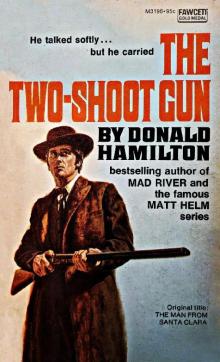 The Two-Shoot Gun
The Two-Shoot Gun Mad River
Mad River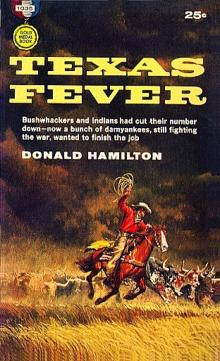 Texas Fever
Texas Fever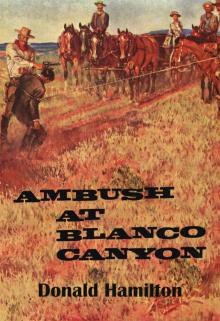 Ambush at Blanco Canyon
Ambush at Blanco Canyon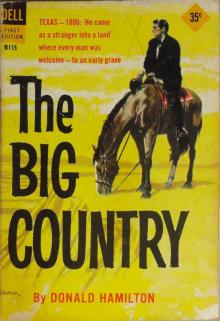 The Big Country
The Big Country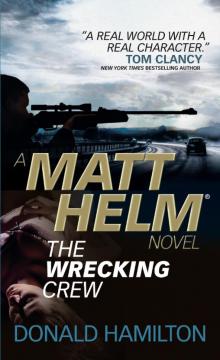 The Wrecking Crew
The Wrecking Crew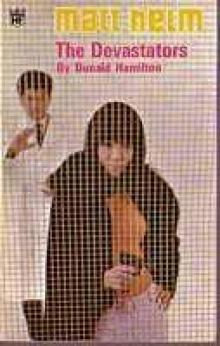 The Devastators mh-9
The Devastators mh-9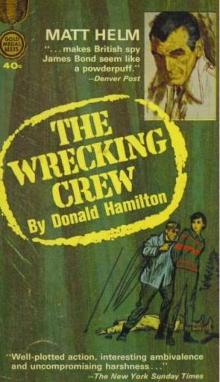 The Wrecking Crew mh-2
The Wrecking Crew mh-2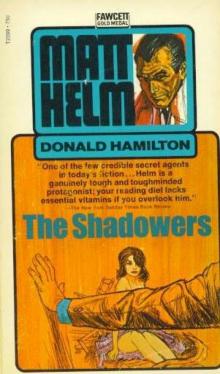 The Shadowers mh-7
The Shadowers mh-7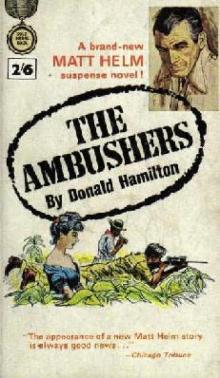 The Ambushers mh-6
The Ambushers mh-6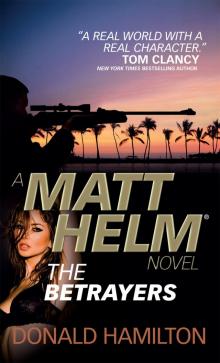 The Betrayers
The Betrayers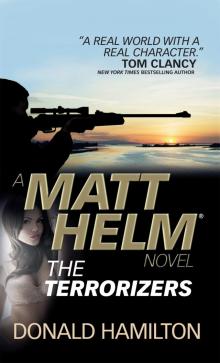 The Terrorizers
The Terrorizers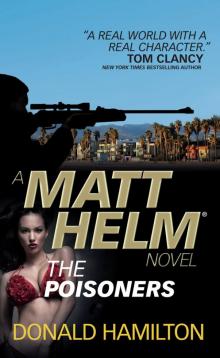 The Poisoners
The Poisoners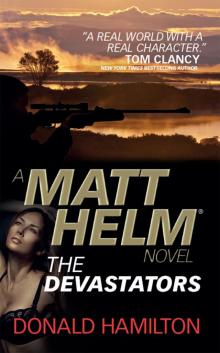 The Devastators
The Devastators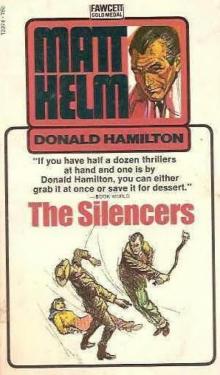 The Silencers mh-5
The Silencers mh-5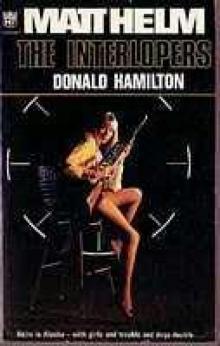 The Interlopers mh-12
The Interlopers mh-12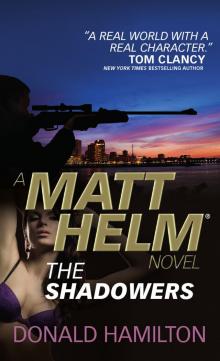 The Shadowers
The Shadowers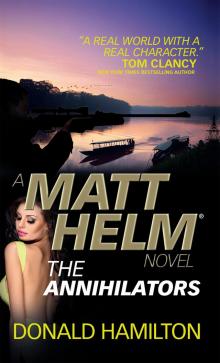 The Annihilators
The Annihilators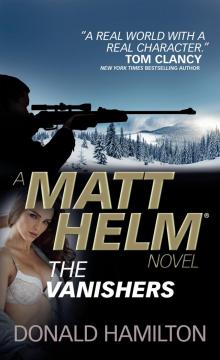 The Vanishers
The Vanishers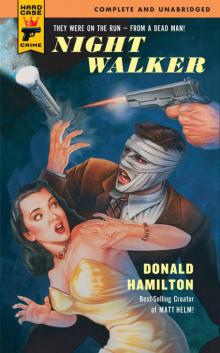 Night Walker
Night Walker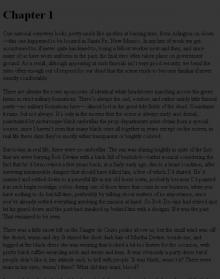 The Revengers
The Revengers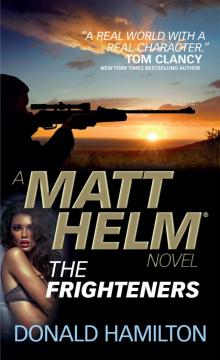 The Frighteners
The Frighteners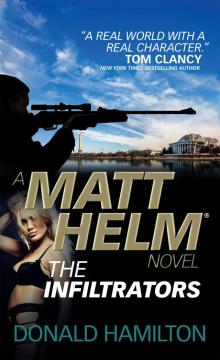 The Infiltrators
The Infiltrators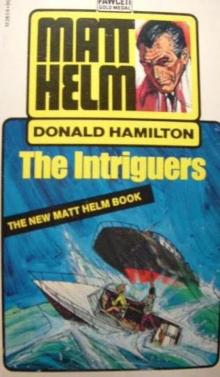 The Intriguers mh-14
The Intriguers mh-14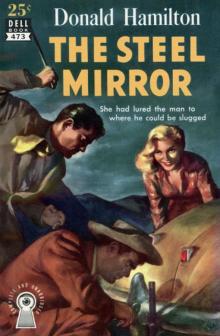 The Steel Mirror
The Steel Mirror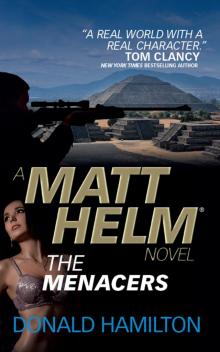 The Menacers
The Menacers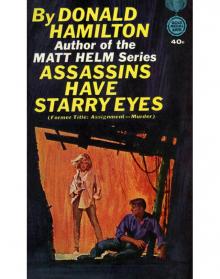 Assassins Have Starry Eyes
Assassins Have Starry Eyes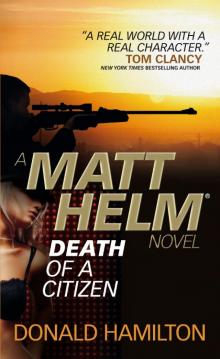 Death of a Citizen
Death of a Citizen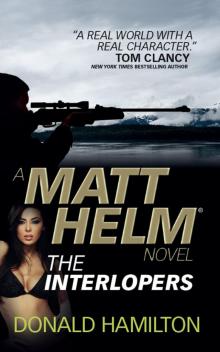 Matt Helm--The Interlopers
Matt Helm--The Interlopers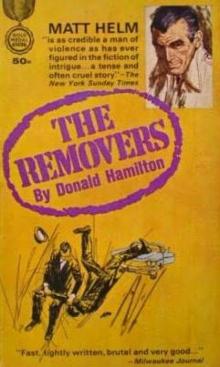 The Removers mh-3
The Removers mh-3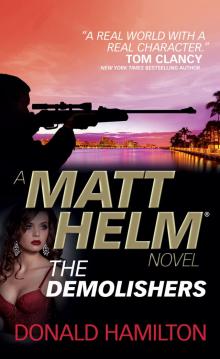 The Demolishers
The Demolishers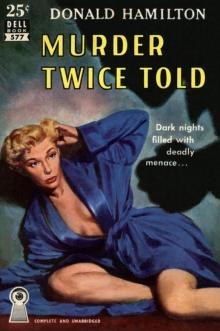 Murder Twice Told
Murder Twice Told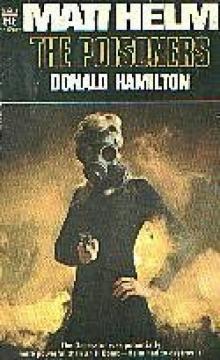 The Poisoners mh-13
The Poisoners mh-13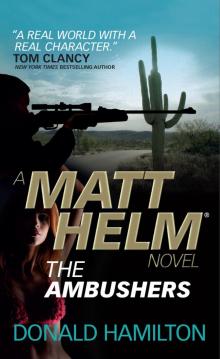 The Ambushers
The Ambushers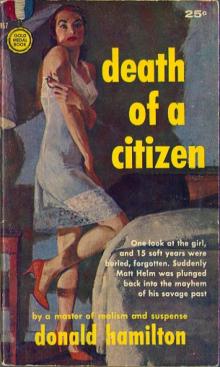 Death of a Citizen mh-1
Death of a Citizen mh-1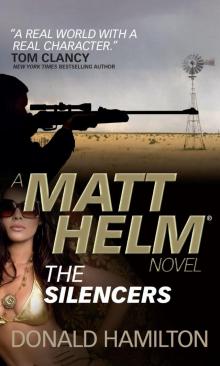 The Silencers
The Silencers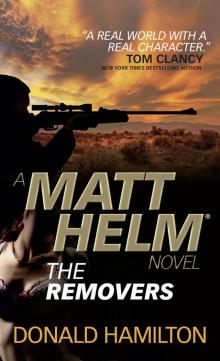 The Removers
The Removers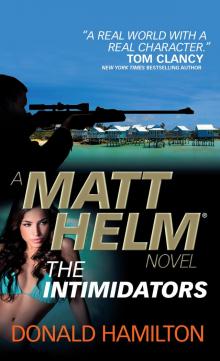 The Intimidators
The Intimidators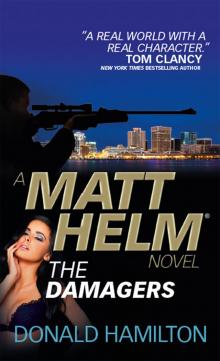 The Damagers
The Damagers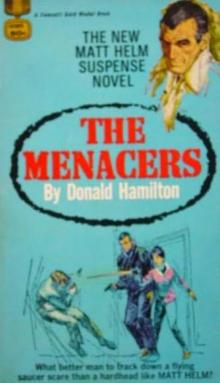 The Menacers mh-11
The Menacers mh-11 The Retaliators
The Retaliators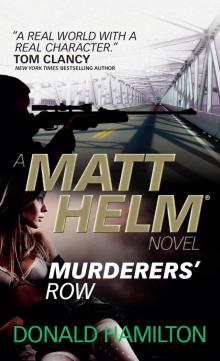 Murderers' Row
Murderers' Row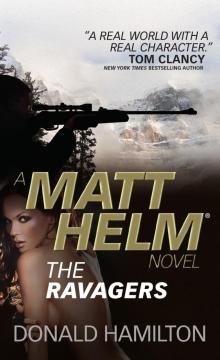 The Ravagers
The Ravagers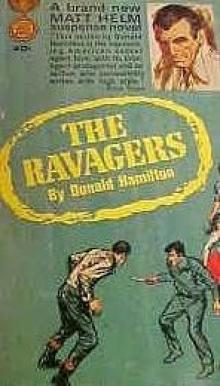 The Ravagers mh-8
The Ravagers mh-8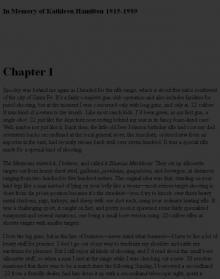 The Threateners
The Threateners The Betrayers mh-10
The Betrayers mh-10